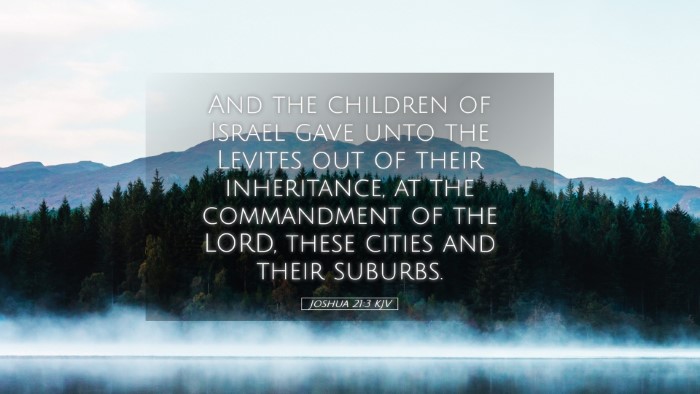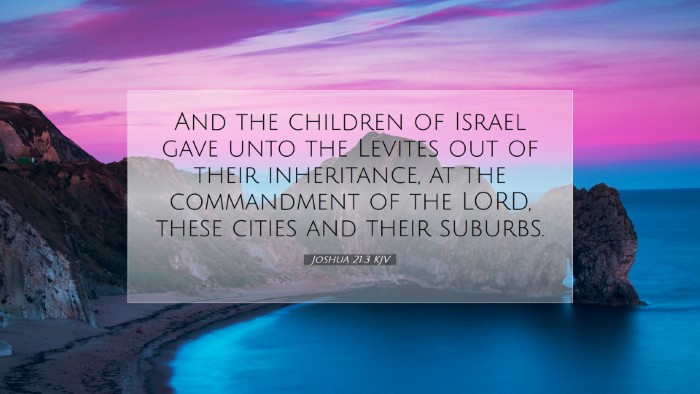Commentary on Joshua 21:3
Joshua 21:3 states: "And the children of Israel gave unto the Levites out of their inheritance, at the commandment of the Lord, these cities and their suburbs." This verse is part of a larger narrative that highlights the distribution of cities to the Levites as their inheritance among the tribes of Israel.
Contextual Overview
The passage follows the conquest of Canaan and the allocation of the land to the tribes of Israel. The Levites, in accordance with God’s instructions, were granted cities instead of a territorial inheritance like the other tribes. This allocation speaks volumes about God's order and intention for His people.
Theological Significance
The Levites were the priestly tribe, called to serve God and lead His people in worship. Their inheritance of cities instead of a specific region symbolically illustrates the principle that God Himself is their portion.
-
God's Provision: Just as God provided for the Levites, it reflects His ongoing provision for those who serve Him.
-
Separation unto God: The Levites were set apart for the service of the Lord, highlighting the importance of holiness and dedication.
-
Community Responsibility: The cities given to the Levites serve as a reminder of the communal responsibilities towards spiritual leaders.
Commentary from Notable Theologians
Matthew Henry's Commentary
Matthew Henry notes that the care taken for the Levites demonstrates God's provision for those dedicated to His service. He emphasizes that the Levites' cities represent a vital aspect of their ministry, ensuring they remain close to the people they serve.
Henry points out that while they did not receive an extensive land inheritance, they had cities strategically placed throughout Israel, enabling them to fulfill their roles effectively. This arrangement reinforces the practical need for spiritual leaders within the community.
Albert Barnes' Notes
Albert Barnes elaborates on the meaning behind the allocation. He articulates that the inheritance of the Levites reflects the divine wisdom in distribution, promoting the vitality of religious leadership amid the societal structure.
Barnes also stresses the cities served dual purposes: they ensured the Levites could perform their priestly duties while also serving as cities of refuge, embodying safety and sanctuary for those in need.
Adam Clarke's Commentary
Adam Clarke provides an insightful examination of the cities and their suburbs, noting their significance in the larger geographical context. He emphasizes that God’s commands lead to a structured governance among the people of Israel.
Clarke also clarifies that the cities provided a means for the Levites to reside among the people, emphasizing that their presence was essential for spiritual guidance and support. The Levites, therefore, acted as a conduit between God and the Israelites.
Application for Today
This allocation of cities holds several applications for contemporary Christian communities, including:
-
Valuing Spiritual Leaders: Just as the Israelites supported their priests and Levites, today’s congregations should ensure that their leaders are provided for and valued.
-
Holiness and Separation: The Levites' example encourages believers to pursue holiness and dedicate their lives to the Lord’s service.
-
Creating Safe Havens: The cities of refuge suggest modern believers must contribute to creating spaces where individuals can find support amid crises or sins, reflecting Christ’s love and grace.
Conclusion
Joshua 21:3 encapsulates the divine orchestration of community and ministry within Israel, serving as a timeless reminder of God’s provision and the essential role of spiritual leaders. Acknowledging the Levites' cities allows pastors, students, and scholars to reflect on the importance of spiritual leadership, communal responsibility, and the continuous need for God’s presence in their midst.


